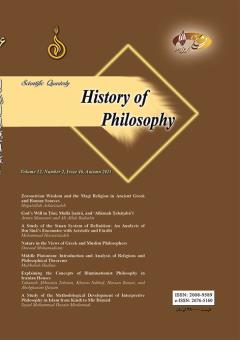Nature in the Views of Greek and Muslim Philosophers
Subject Areas : مطالعات تطبیقی تاریخ فلسفه
1 - Assistant Professor, Payame Noor University, Tehran, Iran
Keywords: Nature, physis, Technē, archē, pre-Socratic philosophers, Stoics, Aristotle, Plato, Muslim philosophers,
Abstract :
Undoubtedly, nature has always attracted the attention of scientists and philosophers as the loci of the genesis and growth of natural existents and its current. Scientists working in the field of empirical sciences mainly seek the knowledge of natural existents and laws of nature, while philosophers basically deal with the knowledge of nature itself and its structure and try to provide an answer to the questions of what the meaning of nature is, what its structure is, what relationship exists between existents and nature, whether nature is the primary source of the appearance of existents in the world, and whether nature, as matter and form, is a cradle for the appearance of various forms of existents. Greek philosophers and, later, Muslim philosophers have provided various responses to these questions. In ancient Greek philosophy, physis or nature means growth, living, and life. This meaning, which had provided the basis for pre-Socratic philosophy, changed into the “content of the world” and “maker of things” in Stoic philosophy. Plato also defined physis as the origin of the appearance of all things. He used the words technē (art) and archē (origin) to explain the emergence of the world and considered the creation of the world as an artistic innovation. Aristotle, who viewed the world synonymous with the whole nature, believed that nature is the source of motion and change in things; however, Muslim thinkers have provided various ideas about nature. Ikhwān al-Ṣafā maintained that nature is the fifth level of the levels of being and the “active” aspect of the world, with matter as its passive aspect. Ibn Sīnā considered nature and the interactions therein as God’s act and believed that nature is the cause of the appearance of corporeal substance by synthesizing matter and form. Unlike the Peripatetics, who believed that archetypes are the same as the nature of things, Suhrawardī rejected archetypes and replaced them with luminary nature. Finally, Mullā Ṣadrā viewed the world of nature identical with renewal and change and maintained that the nature of substance enjoys permanent motion and flow.
ابنسینا (1376) الهیات من کتاب الشفاء، تحقیق حسن حسنزاده آملی، قم: دفتر تبلیغات اسلامی.
ابنسینا (1383) طبیعیات دانشنامه علایی، همدان: دانشگاه بوعلی سینا.
ابنسینا (1385) الهیات نجات، ترجمه و شرح یحیی یثربی، تهران: بوستان کتاب.
ابنسینا (1387) الاشارات و التنبیهات، قم: بوستان کتاب.
ابنسینا (1404ق) الشفاء، ج۱، الطبیعیات، قم: كتابخانة آیتالله مرعشی نجفی.
ابنسینا (بیتا) الهیات شفا، تحقیق ابراهیم مدکور، (بیجا).
اخوان الصفا (1928م) رسائل، قاهره: مطبعة العربیة.
اخوان الصفا (1949م) رسالة الجامعة، ج ۱، تصحیح جمیل صلیبا، دمشق: مطبعة الترقی.
ارسطو (1377) متافیزیک (مابعدالطبیعه)، ترجمة شرفالدین خراسانی، تهران: حکمت.
افلاطون (1380) دوره آثار، ترجمة محمدحسن لطفی و رضا کاویانی، تهران: خوارزمی.
برن، ژان (1362) فلسفه رواقی، ترجمة سید ابوالقاسم پورحسینی، تهران: امیرکبیر.
دورانت، ویل (1371) تاریخ فلسفه، ترجمة عباس زریاب، تهران: انتشارات انقلاب اسلامی.
دیباجی، سیدمحمدعلی؛ ناسخیان، علیاکبر (1399) «بازشناسی مفهوم طبیعت در فلسفة سهروردی در پرتو نقد صورت نوعیه»، آموزههای فلسفۀ اسلامی، سال 15، شمارة ۲۶، ص132ـ111.
سهروردی، شهابالدین (1393) حکمة الاشراق، تصحیح محمد ملکی، تهران: پژوهشگاه علوم انساني و مطالعات فرهنگي و دانشگاه اديان و مذاهب.
عبدالرحیمزاده، سید نعمتالله (1396) «نظر و عمل در آغاز فلسفه»، غربشناسی بنیادی، سال 8، شمارة 2، ص28ـ1.
فلاطوری، عبدالجواد (1363) «تحول بنیادی فلسفة یونان در پرتو اندیشه اسلامی»، دومین یادنامه علامه طباطبایی، تهران: مؤسسه مطالعات و تحقیقات فرهنگی.
قوام صفری، مهدی (1387) نظریۀ صورت در فلسفۀ ارسطو، تهران: حکمت.
کاپلستون، فردریک (1375) تاریخ فلسفه، ج1: یونان و روم، ترجمة سیدجلالالدین مجتبوی، تهران: علمی و فرهنگی و سروش.
مصباح یزدی، محمدتقی (۱۳۸۳) شرح الهیات شفا، ج۱، قم: مؤسسة آموزشی و پژوهشی امام خمینی.
ملاصدرا (1380) الحكمة المتعالية فی الأسفار الأربعة، ج2، تصحيح و تحقيق مقصود محمدي، تهران: بنياد حكمت اسلامي صدرا.
ملاصدرا (1381) الحکمة المتعالیة فی الأسفار الاربعة، ج5، تصحيح و تحقيق رضا محمدزاده، تهران: بنياد حكمت اسلامي صدرا.
ملاصدرا (1383) الحکمة المتعالیة فی الأسفار الاربعة، ج3، تصحيح و تحقيق مقصود محمدي، تهران: بنياد حكمت اسلامي صدرا.
ملاصدرا (1391) الشواهد الربوبية فی مناهج السلوكية، تصحيح و تحقيق سيد مصطفي محقق داماد، تهران: بنياد حكمت اسلامي صدرا.
موسوی مهر، سیدمهدی (1392) «وساطت علیت به معنای یونانی در درک هایدگر از تکنولوژی»، دوفصلنامه فلسفی شناخت، شمارة 68، ص151ـ133.
نصر، سیدحسین (1342) نظر متفکران اسلامی درباره طبیعت، تهران: دانشگاه تهران.
هایدگر، مارتین (1375) پرسشی در باب تکنولوژی، ترجمة محمدرضا اسدی، تهران: مؤسسة فرهنگی اندیشه.
هایدگر، مارتین (1389) عمارت، سکونت، فکرت در شعر، زبان و اندیشۀ رهایی، ترجمة عباس منوچهری، تهران: مولی.
هایدگر، مارتین (1394) سرآغاز کار هنری، ترجمه پرویز ضیاء شهابی، تهران: هرمس.
Burnet, John (1920). Early Greek Philosophy. 3rd edition. London: A & C Black.
Fawcett, Nicholas (2011). Aristotle's Concept of Nature: Three Tensions. Electronic Thesis and Dissertation Repository. The University of Western Ontario, Ontario, Canada.
Guthrie, W. K. C. (1981). A History of Greek philosophy. Vol. VI: Aristotle: an Encounter. Cambridge University Press.
Naddaf, Gerard (2005). The Greek Concept of Nature. Albany: State University of New York press.
Plato (1921). The Laws. translated by Benjamin Jowett Longmans. London: Green and Co.

